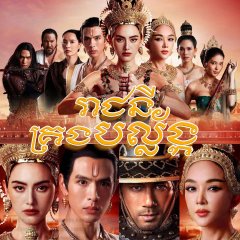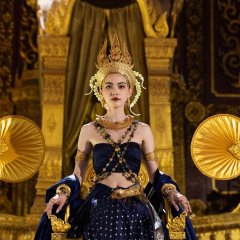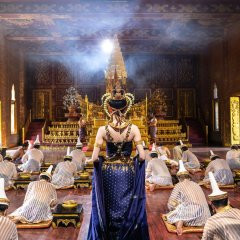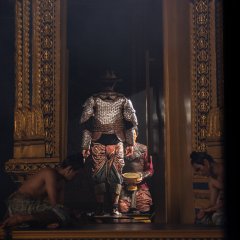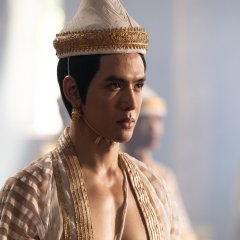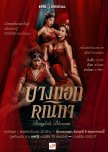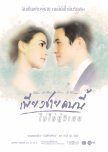- Português (Brasil)
- Русский
- English
- Español
- Título original: แม่หยัว
- Também conhecido como:
- Diretor: Sant Srikaewlaw
- Roteirista: Sirilux Srisukon
- Gêneros: Histórico, Romance
Elenco e Créditos
- Mai Davika HoorneJinda / Sri SudachanPapel Principal
- Film Thanapat KawilaWamon / WorawongsathiratPapel Principal
- Sajakul ThiraphatKing ChairachaPapel Secundário
- Panward HemmaneeJittrawadi / IndrasurenPapel Secundário
- Bint Sireethorn LeearamwatLa-ongkham / Sri JulalakPapel Secundário
- Fern Nopjira LerkkajornnamkulTanyong / IndravediPapel Secundário
Resenhas

Nicely crafted, dramatized depictions of historical figures.
‘Empress of Ayodhaya’ is a fictionalized story of Phraya Mae Yuhua Sri Sudachan, the one of four first-class concubines of King Chairachathirat and her journey to power and influence in the ancient kingdom of Ayodhaya.When it comes to drama centered on monarchs and royal courts, betrayals, alliances, and backstabbing are things to expect. Though the story is not something particularly novel, the storylines are nicely crafted and presented in fast-paced and engaging plots. The affair between Sri Sudachan and Phan Butsrithep adds a more complex layer to the story as they plot to take over the throne.
One thing I like about this drama is the well-developed protagonists and antagonists. Davika did a pretty good job portraying Jinda/Sri Sudachan, distinguishing it from other historical roles she played before. Though, at times her acting seems to lack impact, she managed to bring complexity to the character. Film Thanapat's performance as devious Phan Butsrithep is commendable. The character deserves all the hate.
While this drama doesn't depict a heroic, strong woman, it shows a journey that takes us back to a time when women had to rely on their wit and intelligence to navigate the complex and often treacherous world of royal courts. It doesn’t always take physical strength to win over something. And I also like that this drama focuses less on the rivalry between the four concubines (Thao Indrasuren, Thao Indratevee and Thao Sri Chulalak) but rather on the significant roles those women played in Sri Sudachan's rise, treachery, and downfall.
It’s recommended for anyone who likes the complexity of ancient Thai history. Just bear in mind that this drama is a dramatized depiction of historical events and figures, so it's not historically accurate. Simply enjoy it for the dramatic storylines it offers.
Esta resenha foi útil para você?

An original take on a unique chapter in Thai history, but loses its way towards the end
The annals of Thai history in the Kingdom of Ayutthaya during the 16th century are sparsely detailed, save for a few chapters of political intrigue. Among them, the story of Thao Si Sudachan, the consort of King Chairacha who became regent to her young son following her husband's death in 1547, only to commit filicide and elevate her lover to the throne as an usurper soon after, is one of the best known. Previously depicted in the 2001 epic The Legend of Suriyothai and 2005's The King Maker, the traditional story depicts Si Sudachan as a scheming villainess who upsets the peace of Ayutthaya (also known as Ayodhya, according to some sources). But history is written by the victor, and it's always inviting to imagine what the other side of the story might be.One31's The Empress of Ayodhaya does just that, giving an original reimagining of Si Sudachan's life from her point of view. As a work of historical fiction, it opens solidly, clearly laying out the history and tying the characters to their historical counterparts. The opening episodes shine with their focus on the intricate palace intrigue between various factions, in a manner that evokes the early seasons of Game of Thrones. Si Sudachan (Mai Davika), here known by the fictional personal name Jinda (Si Sudachan being a royal title), is introduced as a strong and intelligent female figure intent on playing the game in order to put herself on the throne and reunite with her lover Wamon (Film Thanapat). The series features pretty much everything one would expect from an epic historical piece, with some modern twists. The acting is great, and the sets, costumes, and art design are marvellous (to the layperson at least. Will have to defer to experts regarding historical accuracy). While there are noticeable goofs here and there, they aren't so serious as to detract from the whole story.
But the story pretty much loses its way towards the end. In overextending their efforts to have the audience sympathize with Jinda, the writers turn what was initially a strong, interesting, morally grey character into a passive, helpless victim in constant need of rescue. Where in episode 1 Jinda shows rumours of supernatural events to be superstition, black magic suddenly exists and is real by episode 7. The factional struggles ultimately devolve into a simplistic good-guys-vs-bad-guys tale. While it's understandable that the ending is constrained by the outcome of history, the way it was handled ended up being utterly unsatisfying.
And then there's the animal welfare issue. While I won't judge the work by the issues that happened as part of the production, it still needs to be mentioned. Whatever the ultimate outcome, here's hoping that future productions learn from the lesson.
Esta resenha foi útil para você?
Recomendações
There have been no recommendations submitted. Be the first and add one.








